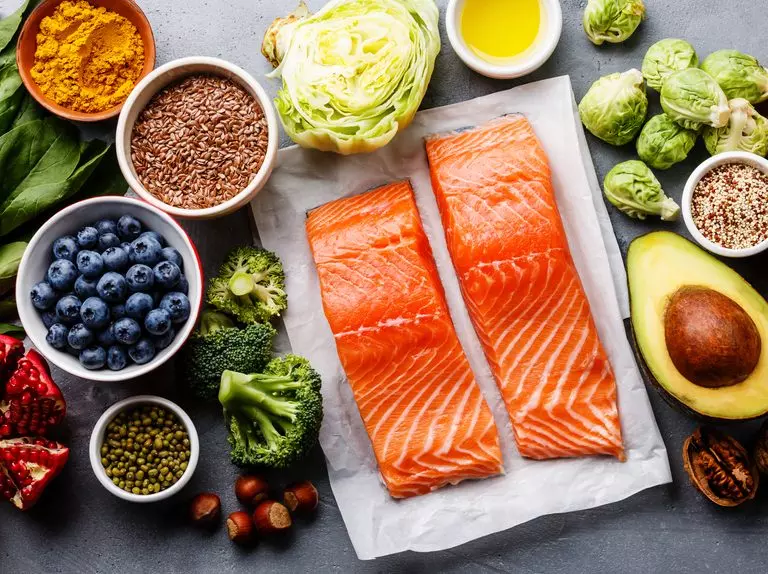Adopt anti-inflammatory diet
After actresses like Vidya Balan and Samantha Ruth Prabhu spoke of its benefits, the anti-inflammatory diet is resurgent

The anti-inflammatory diet is quickly becoming popular in today’s health-conscious society, not just as a fad but also as a comprehensive strategy for prevention and rehabilitation. The diet targets chronic inflammation, a major contributor to lifestyle and autoimmune diseases, and is based on nutrient-dense, whole foods.
Keeping it Simple
The science underlying an anti-inflammatory diet, its advantages for gut health, and its potential for treating chronic conditions are all examined in this article. The body uses inflammation as a natural defence against poisons, infections, and injuries. Healing requires acute inflammation, which manifests as pain, heat, oedema, and redness. On the other hand, diabetes, heart disease, Alzheimer’s, and autoimmune disorders can result from chronic inflammation, which keeps the body on high alert. “It is important to use ingredients that are not very complex. Non vegetarian food is acidic in nature so it is ruled out. When food is pure, in terms of not being artificially flavoured, coloured, or seasoned. As these processed additions, make them inflammatory. If you add too much salt, sugar or spices it will make the food inflammatory. Onions for instance have quercetin, a natural pigment that has antioxidant and anti-inflammatory properties. Garlic also has allicin, a compound that can help ease inflammation. This is why onion and garlic can be added to other vegetables to reduce inflammation. I also suggest maintaining a disciplined time schedule for your meals and making sure that you eat food at the right temperature, not very hot or very cold,” says Arvind Joshi, Executive Sous Chef, Swastik Wellbeing Sanctuary.
Arvind Joshi, Executive Sous Chef, Swastik Wellbeing Sanctuary
Picture Courtesy : By arrangement
Mend Bad Habits
Bad eating habits are one of the main causes of chronic inflammation. The immune system is strained by processed foods, refined carbohydrates, bad fats, and additives, which prolong an inflammatory reaction. By adopting an anti-inflammatory diet, these effects can be lessened and the body can recover and perform at its best. “Trillions of bacteria in the stomach affect immunity, digestion, and general health. To control gut inflammation and avoid autoimmune disorders, a healthy gut flora is fostered by an anti-inflammatory diet. Foods low in fermentable oligosaccharides, disaccharides, monosaccharides, and polyols (FODMAPS) help people with IBS or gut sensitivities feel less bloated, gassed, and unc-omfortable. Added sugars damage gut flora and increase inflammation. Better substitutes are natural sweeteners like honey or stevia when used sparingly. Some people, particularly those with non-celiac gluten sensitivity or coeliac disease, may be sensitive to gluten. Choose gluten-free grains such as millet and quinoa,” says Dr. Manoj Kutteri, Medical Director & CEO, of Atmantan Wellness Centre.
Dr. Manoj Kutteri, Medical Director & CEO, of Atmantan Wellness Centre.
Picture Courtesy : by arrangement
Balance it out
Consuming a lot of carbohydrates, particularly refined carbohydrates, raises blood sugar levels and encourages inflammation. Nuts, seeds, avocado, olive oil, and other healthy fats lower inflammatory indicators and offer long-lasting energy. Freshly prepared foods are essential for promoting intestinal health and decreasing inflammation. “Freshly made meals preserve their original nutrient profile, which includes fibre, antioxidants, and phytonutrients, in contrast to processed foods, which are frequently loaded with artificial additives, preservatives, harmful fats, and refined sugars. These nutrients support a balanced microbiome, which is essential for lowering inflammation, fighting oxidative stress, and healing damage to the gut lining. Conversely, processed foods cause blood sugar surges, damage gut flora, and exacerbate chronic inflammation, which can result in metabolic disorders, autoimmune diseases, and leaky gut. In addition to providing the body with nourishment, putting an emphasis on whole, fresh ingredients also releases anti-inflammatory components that promote healing and promote intestinal health,” says Kutteri.
TIPS
Pre-cooking of Meals: Prepare meals beforehand. They should then be allowed to have anti-inflammatory ingredients like vegetables, and protein sources like lean, and whole grains.
Mindful Cooking: Grilled, steamed, or sautéed in olive oil rather than deep frying. If one is just starting with an anti-inflammatory diet, start by adding one or two healthy foods per week and eliminate all the pro-inflammatory food stuff gradually.
Play with Herbs and Spices: Turmeric and ginger are not just yummy but are also powerful
anti-inflammatory foods. Add them to your meals, smoothies, or tea.
Health First
The anti-inflammatory diet is based on food that will bring down chronic inflammation in one’s body. Chronic inflammation causes many health issues, including heart disease, diabetes, arthritis, and even some kinds of cancer. The diet is based on antioxidant-rich food with omega-3 fatty acids and fibre. All foods that increase inflammation, such as processed foods and added sugars, are removed from the diet. “Start your day with oatmeal topped by berries, nuts, and a pinch of cinnamon. Add spinach or kale to smoothies, salads, or omelettes for a simple increase in anti-inflammatory compounds. Add a couple of fatty fish like salmon or sardines a few times a week. If you are not fond of fish, then take some omega-3 supplements. Trade soda or sports drinks for green tea, because it is an antioxidant versus sugar or caffeine,” says Dietitian Vidhi Chawla, founder of Fisico Diet and Aesthetic Clinic. Adopting an anti-inflammatory diet is all about making the right choices, choose well and you can see the changes for yourself.
Dietitian Vidhi Chawla, founder of Fisico Diet and Aesthetic Clinic
Picture Courtesy : By Arrangement

